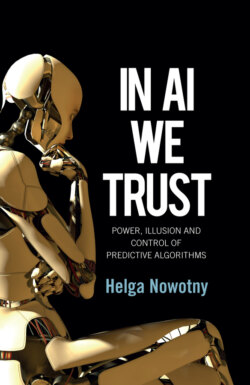In AI We Trust

Реклама. ООО «ЛитРес», ИНН: 7719571260.
Оглавление
Helga Nowotny. In AI We Trust
Table of Contents
Guide
Pages
In AI We Trust. Power, Illusion and Control of Predictive Algorithms
Copyright Page
Acknowledgements
Introduction: A Personal Journey into Digi-land. Origins: time and uncertainty; science, technology and society
The maze and the labyrinth
The road ahead: how to live forward and understand life backwards
1 Life in the Digital Time Machine. Between the mud and the sky: the birth of the digital Anthropocene
The past reaches the present and the (visible) future has arrived
The open horizon of the future
2 Welcome to the Mirror World. A mirror world in the making
Humans and their digital others
Identity anxieties: loss and redefinition of the self
3 The Quest for Public Happiness and the Narrative of Progress. The contagiousness of narratives
Breadfruit, potatoes and the idea of progress
Human enhancement, control and care
4 Future Needs Wisdom. Why wisdom is needed
Pathologies of AI: ethics is more than a checklist
The enduring lure of the Leviathan
5 Disruption: From BC (Before COVID-19) to AD (After Domestication) What a biological virus teaches us about our bodies in a digital world
The domestication of work
From domestication to self-domestication
Bibliography
Index
POLITY END USER LICENSE AGREEMENT
Отрывок из книги
Helga Nowotny
My thanks go to all those who supported me in different ways on this long journey. Jean-Luc Lory offered me again a brief stay of hospitality at the Maison Suger in Paris, a wonderful place of calm in the centre of a buzzing metropolis. Another brief stay that I looked forward to, at the Wissenschaftskolleg zu Berlin, had to be cancelled due to abruptly imposed travel restrictions. Despite the missed occasion I was able to remain in fruitful exchange with Elena Esposito. I also want to thank Vittorio Loreto, of the Sony Lab Paris, for an especially inspiring conversation over dinner in Vienna. While the meal was frugal due to constraining circumstances, the discussion was rich. Stefan Thurner, who heads the Complexity Science Hub in Vienna, has been a continued source of inspiration and productive criticism. I received valuable feedback from him on parts of the manuscript, for which I am very grateful. Special thanks go to Michele Lamont at Harvard University for intellectual and moral support throughout the long stretch of the gestation period. Ever since we first talked about the book over a delicious lunch in New York City, Michele has responded to all my queries and provided me with continued encouragement.
.....
Scattered and inconclusive as these conversations mostly were, they nevertheless projected the image of a dynamic field rapidly moving forward. The main protagonists were eager to portray their work as incorporating their responsibility of moving towards a ‘beneficial AI’ or similar initiatives. There was a notable impatience to demonstrate that AI researchers and promoters were aware of the risks involved, but the line between sincere concern and the insincere attempts of large corporations to claim ‘ethics ownership’ was often blurred as well. Human intelligence might indeed one day be outwitted by AI, but the discussants seldom dwelt on the difference between the two. Instead, they offered reassurances that the risks could be managed. Occasionally, the topic of human stupidity and the role played by ignorance were touched upon as well. And at times, a fascination with the ‘sweetness of technology’ shimmered through, similar to that J. Robert Oppenheimer described when he spoke about his infatuation with the atomic bomb.
At one of the many conferences I attended on the future of AI, the organizers had decided to use an algorithm in order to maximize diversity within each group. The AI was also tasked to come up with four different haikus, one for each group. (Incidentally, the first time an AI succeeded in accomplishing such a ‘creative’ task was back in the 1960s.) The conference was a success and the discussions within each ‘haiku group’ were rewarding, but somehow I felt dissatisfied with the haiku the AI had produced for my group. So, on the plane on my way back I decided to write one myself – my first ever. With beginner’s luck the last line of my haiku read ‘future needs wisdom’.
.....